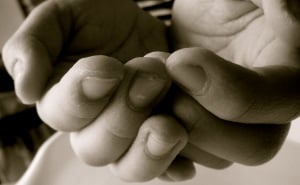The Amish & Two Kingdoms Doctrine
Three points I wanted to discuss on the Missouri Amish abuse case. I confess my previous post on the issue was a bit hastily and not too terribly well written. I also wish I were more of an expert on the Amish approach to two kingdoms doctrine as it would likely come in handy in such cases. I find the two kingdoms doctrine fascinating but at times confusing, and it is not my strongest point. So I welcome any contributions from those with a more robust understanding. But, that said, I wanted to note a few points.
Transgression and Punishment
First, what was intended in the “no moral question” sentence. This can be misleading in that I introduced the post as being about the issue of the bishops failing to report abuse, and then made this statement which was in essence referring to something else, and my language was regretfully not too precise either.
The statement was meant to refer to the idea of a private system by which a religious group, the Amish in this case, would render religious justice for what would be considered by society as criminal offenses. With punishment for all offenses in such a system typically amounting to a few weeks in the Bann (which may be serious enough for those in the Bann mulling the afterlife, but in one measure pales in comparison to, say, the disruption to a life due to years of incarceration), one can imagine that there would be a highly diminished fear of life-altering retribution deterring abusers, or other potential offenders. Fear of excommunication is one thing, and Amish have spent short spells in jail in the past when standing up against civil law which has conflicted with religious belief, but as a deterrent I have to imagine that the prospect of six weeks of eating apart would pale in comparison to the thought of two decades detached from your community and deprived of freedom in prison.
The potential for harm to occur undeterred in such a system which delivers what amounts to a comparatively mild religious/social punishment would be huge. I’m not saying that Amish such as those in this Missouri community would handle all transgressions/crimes in the same manner, but essentially what occurred here was a case of serious abuse known to a significant number of people. Were the same thing to happen in other societies, and sexual abuse were to become known to a number of people in a given community, the response would likely be much different.
I assume most would feel a strong obligation to report such knowledge–first and foremost in the interest of protecting children from further instances of abuse–which the people involved here presumably did not due to an understanding that such issues are handled within the church system of discipline. It’s unclear here when forgiveness was rendered, or at what point the bishops became aware, or if Schwartz confessed and then continued in the behavior, and so on. But what is clear is that Schwartz committed his acts of abuse against his two victims repeatedly over a year’s time, indicating that his behavior was recurrent, and thus one could conclude posed a legitimate continuing danger to his community, regardless of whether he had been forgiven by them.
By comparison, the potential for harm done by Amish removing their children from school at grade eight, an area where Amish have achieved an exemption from a legal obligation that most others do not have based in a religious argument, is minimal, or at least of a much different nature. Some may argue that there could be “harm” done in this area, if one considers lack of school education harmful, but it is of a decidedly different nature to physical and psychological abuse which could result and continue unchecked due to the disproportionally lenient punishment in the theoretical system of justice described above.
I am not a lawyer, but in the first case, it seems one would be hard-pressed to find an argument that a religious group has a right to resolve what would be considered extremely serious and harmful offenses in such a manner, outside of the established system of justice. I know that is not what was originally being discussed here so it is not really the issue, but in any case that was the original, not well-explained, and perhaps obvious, point I wished to make. If I’m still off-track here, I welcome any insights.
But “did the bishops as religious leaders have an obligation to report a confession?” seems a different issue to whether they should have a religiously-based right to adjudicate serious transgressions off the legal grid. There may very well be religious grounds in their defense on this point. And in this aspect, the case has much to do with “religious matters”. Other questions include: How is the bishops’ situation or the Amish congregation’s situation when hearing a public confession different from that of a Catholic priest hearing confessions? Why are four bishops involved? Do other members of the community who heard the confession or knew of the offenses have an obligation as well? These are issues which I don’t have answers on and will leave for now but welcome comments on.
Two Kingdoms Doctrine
A point was raised by reader Jacob in response to the previous post. Do Amish consider those that render justice immoral, or those acts themselves immoral? The answer to this question may lie in an examination of the “two kingdoms” doctrine which Amish adhere to. The doctrine, which I mentioned briefly in the previous post, is on first read seemingly simple. It is at the same time paradoxical.
According to Article XIII of the Dordrecht Confession which Amish accept before baptism, Amish view civil government as being instituted by God “for the punishment of evil and the protection of the good as well as to govern the world and to provide good regulations and policies in cities and countries. Therefore, we must not resist, despise, or condemn the state. We should recognize it as a minister of God. Further, we ought to honor and obey it and be ready to perform good works in its behalf insofar as it is not in conflict with God’s law and commandment…”.
Amish have resisted the state when they see its law to conflict with God’s, as in the case of SMV triangles, Social Security, and so on. Amish themselves opt out of participating in civil institutions which enforce the law as well as political office, which often requires the assertion of state will upon others by force. Scholar of the Amish Paton Yoder notes that while accepting the state as instituted by God, Amish readily identify it with coercion, an aspect “which most contradicts their own world-view.”
Obviously Amish do rely on the state’s military protection, law enforcement, and agents who render justice to keep them safe. To take one extreme, in the Ed Gingerich murder case, Amish from Gingerich’s community fearing for their own safety pleaded that he be locked away after he was released from a prison psychiatric ward just a few years after brutally killing his wife. The families of Nickel Mines certainly appreciated the selfless service Pennsylvania police officers performed in the aftermath of the killings of their children. Do Amish solicit and accept such aid, yet duplicitously hold the private opinion that the state and its agents are committing an immoral act by protecting them from these dangerous people through their ‘coercion’? I find it hard to reconcile the ideas that Amish who are protected by those agents of the world then privately condemn them and their actions as immoral, especially in cases when they seek the aid themselves.
Yet Paton Yoder notes early Anabaptist Hans Schnell’s writing on the issue, which convey the notions that “the kingdom of this world is based on vengeance; the kingdom of Christ is based on love. The magistrate who, as an agent of the worldly government, metes out vengeance puts himself outside Christ’s kingdom.” Yoder explains that 20th-century Amish leaders, ever-mindful of tradition, rely heavily on the centuries-old principles found within these old writings, leading one to assume that Schnell’s words continue to hold particular relevance today. But in the years following Schnell, Yoder notes, as Anabaptists began to be relieved of a persecution which perhaps originally inspired their brand of two kingdoms thinking, tones toward agents of worldly government seemed to soften and change, with Anabaptists actually expressing a hope that individual agents of friendlier governments may gain an eternal reward after all.
So what do Amish really think? Clearly Amish see a division, which results in a tension. They accept the state, and humbly defer to it when it does not infringe upon the laws of the spiritual kingdom, but do not identify with its ways. Yet without agents of the state to do the dirty work of keeping worldly laws, chaos, death, and a disruption of God’s order would ensue.
Yoder continues, paraphrasing Amishman Elmo Stoll: “In short, the Amish believe that Christians should respect their government, pray for those in power, pay required taxes, and obey the laws of the land except when they conflict with God’s laws.” Yoder goes on to note that “It matters not that the government uses tax money for armaments or other immoral purposes. Most Amish would agree that “when a tax is paid, it is no longer our money, and it is not our responsibility to dictate how it is to be used”…Similarly, the Christian should not tell the government when it may use the sword.” Yoder explains that this Amish renouncement of political duty has been described as a “strategy of withdrawal.”
Some have made a point of criticism of Amish resulting from this paradoxical stance. Yoder describes the paradox of the Amish view of the two kingdoms as a dilemma inherited from early Anabaptists, and one which is to this day unresolved. I cannot do the issue justice myself here, as this is a very basic addressing of it, but I would direct those interested to Paton Yoder’s treatment of the two kingdoms doctrine in The Amish and the State.
How common is abuse among Amish?
Finally, there is the remaining question of how common is abuse in Amish communities. Sexual abuse is an unpleasant topic. I don’t particularly enjoy writing about this on the blog, just as I don’t particularly relish discussing issues such as “puppy mills”. But, I felt I ought to address it as a legitimate issue affecting some Amish.
As I write in the original post, I’d be quite reluctant to say that sex abuse is a widespread problem across Amish society. It may very well be a problem that occurs in isolation, and even to a significant degree in some communities. A system of discipline which resolves issues of sin and transgression primarily internally may lead to conditions which allow abuse to occur and persist, especially when key principles of obedience and submission to authority become detached from a guiding core Christian morality.
An article on Amish abuse at Legal Affairs by senior editor Nadya Labi examines a number of cases in Amish communities. Labi does not paint all Amish with the same brush, noting in the lead-in that the examples of abuse she cites originate from “some places”. Reading the article I notice that many or all of the cases she describes seem to occur in Swartzentruber Amish or other more conservative communities. The default operating procedure in the cases she describes is church confession, a short stay in the Bann, and a return to ‘normal’, but with no alerting of the authorities, and usually with a continuation of the abusive behavior.
On the other hand, since writing the previous post, I have also received Amish input on the Missouri case that without question Schwartz should answer to the state for his crimes.
As to how widespread abuse is, I simply have no way of knowing concretely. But if I had to I would guess that the stance of this Amish informant toward crimes such as sexual abuse would be the more commonly-held one, and I’d like to suppose the much more commonly-held one. I hope that is correct.








Whether this has anything to do with this all I can not say but the amish community you talk about are a very tight knit group and do not like intrusion at all from outsiders I guess you would say. They keep very much to themselves and want to be left alone. I am not saying that is good or bad, just how it is. That said, if the bishops knew of this abuse at the least they should have made sure the children were protected from further harm. Just my thoughts.
The reason, as I understand it, that 4 bishops are involoved in the case is that all 4 of them had knowledge of the abusive situation, (no doubt from discussion on the bann) that they had been informed by a third party (not the abuser or the direct victim and therefore it was beyond a conifdential matter at that point), and that they were in a position of leadership and authority, the same way a school teacher or nurse, etc is in their obligation to report such a thing, by law.
Hopefully I am not just rewriting what was in one of the links you posted, but I was reading all this somwhere…
I am sure the 4 bishops were in a great deal of communication about this, and deciding their actions with the bann. I have the impression that placing the bann on someone is not simply done alone without discussion by one bishop. I got evidence of this when I was discussing the bann with some friends who are recently in it themselves. When we talked about the particular issue that led to that for them, they were saying that some districts are more tolerant about it than others. When I asked if they could just relocate to such a district, even the next district over if they wanted to, they said they would still be under the bann, as all the bishops have to agree with and support the bann if it is put into effect by their bishop. That just illustrated to me the amount of inter-bishop comunication that must occur. So they all must have been together in their knowledge in Missouri, and all obligated by law as having to report such an incident.
Thank you for the thoughtful follow-up. I am also interested in how the Amish view and practice the “two kingdoms” doctrine. I would only caution that this is probably a complex area of thought even among Amish, and that trying to come to a single “the Amish believe this …” statement might be aiming for too high an abstraction.
The doctrine of the two kingdoms is central to Anabaptist “theology.” This is interesting to me, as I am in the process of reading Robert Friedmann’s “The Theology of Anabaptism,” and just finished last week reading “The Chronicles of the Hutterian Brethren” (a large history of the early Hutterians in Moravia and Hungary).
While my comments are certainly not universal, I think they fit what is supposed to be the “ideal.”
Ok, the “world” has its justice system, and is responsible to deal with injustices. It does so, with prisons, punishments, and fines.
The church has its “justice system,” and is to deal with injustices that are committed within the body of believers. This discipline includes rebukes, private and public, and exclusion if the offense continues. The sole purpose is not to mete out “punishment” as such, but to seek for repentance of the offender, and to keep purity in the body if he doesnt repent.
The church has the sole responsibility to keep itself pure, and is not to be trying to “punish” crimes. It is not to mingle with the “justice system” of the world–their modus operandi are quite different.
Once a sin has been rectified by sincere repentance, all is to be forgotten. In the Nickel Mines situation, had the offender lived, the Amish would not have (in theory) instigated charges against him.
I know of an example of theft in a Montana Amish community. The thief was not Amish, but the theft was still never reported to the police. Had the thief been a member, he would have not been reported either. Not turning in a thief who is a member of the church could be seen as “covering up things,” but that is not the case–they simply do not turn to the world’s justice system when theft occurs.
Theoretically, the same would be true with a sexual abuse case. If an outsider would molest an Amish youth, many (some probably would … I am speaking in broad terms here) would not seek “justice” through the “world”. So why should they turn to the world’s justice system when the offender is one of their own, since they would not turn to it for “justice” against an outsider?
If the “world’s” justice system chooses to prosecute a believer’s sin, then that is usually seen as supplementary to church discipline–something outside of the church’s concern– and the truth would be told if they are called to witness. But the church will not instigate the charges.
I see this as consistency, although it can look bad to see something like this happen, and the church does not turn to the civil government. It is seen as “covering up sin.” Yet, I seriously doubt that they would turn to the civil government had the offender not been a part of the church.
If you want to see this type of non-resistance in action, read “The Chronicles of the Hutterian Brethren”! They were robbed, driven out of homes, had the sheets and clothes stole off the bedridden in the middle of the winter, had their youth and sisters raped publicly or saw them tied up and thrown over a horse’s back to be sold on the slave market … yet they did not turn to the civil government to punish the offenders.
And neither did they turn to the civil government when one of their own happened to be the offender (which did occasionally happen). This is not “covering up sin,” it is practicing the doctrine of the two kingdoms.
Anabaptism sees the church and “the world” as two distinct kingdoms that should be kept apart as far as possible.
Mike
Theology, two kingdoms, amish social mores and privacy aside, sex offenders go on a list for the good of the community at large. For the greater good, it is imperative that men like this be identified and dealt with BY THE LAW, not the Ordnung. Sorry, but if this were a murder case, the Amish would hand it over to the law in a heartbeat. But in the patriarchal society that is the Amish, this is just 4 men protecting another man from civil (and justified) justice. As they would if a man were beating his wife half to death. This kind of offender is not going to be sidetracked or deterred from his rampage of abusing kids just because he is placed under the bann for a few weeks or even if he is shunned for life. He would simply be out there, committing his vile crimes upon an uninformed, unprotected society, all because the Amish value their privacy. Sometimes, just sometimes, the Amish need to get with it. They are not always right.
Neither do I condemn thee, go and sin no more. –Jesus
Just as the Amish put someone under the bann (sometimes forever) and say it’s “out of love”, people who do heinous crimes need to be separated from the masses – I’m pretty sure we all agree about that. Very little is being said of the VICTIMS of these crimes and where they fit in. Putting an offender in jail may be seen as “punishment” but we need to remember they are being judged by their peers. Of course the system is flawed at times, as are the Amish. We’re all human and we all want basically the same things (safety, security, privacy, etc.) ~ the difference is in how it’s gone about. I also believe it’s doing something positive in protecting the innocent and those who are not able to protect themselves. I’m also SURE there are Amish victims who will never be the same and will forever be “trapped” because of lack of outside interference and to me, that is what is sad and unfortunate.
Just as the Amish put someone under the bann (sometimes forever) and say it’s “out of love”, people who do heinous crimes need to be separated from the masses – I’m pretty sure we all agree about that. Very little is being said of the VICTIMS of these crimes and where they fit in. Putting an offender in jail may be seen as “punishment” but we need to remember they are being judged by their peers. Of course the system is flawed at times, as are the Amish. We’re all human and we all want basically the same things (safety, security, privacy, etc.) ~ the difference is in how it’s gone about. I also believe it’s doing something positive in protecting the innocent and those who are not able to protect themselves. I’m also SURE there are Amish victims who will never be the same and will forever be “trapped” because of lack of outside interference and to me, that is what is sad and unfortunate.
Everyone is making great points and I love reading everyone’s points of view. Have a GREAT Thanksgiving, all!
Great post, Erik, and good job clarifying and enlightening.
I agree with you Beth on getting to hear everyone’s points of view, and I do appreciate all the input. I will try to return to the topic and comment again soon. It’s obviously one for some thought.
To begin I will state that abuse, and the failure to report it to the proper authorities, is not exclusive to Amish communities.
I am a middle-aged cradle Catholic Christian and for years I suspected sexual abuse was occuring in the Catholic church and being covered up, or might I say “forgiven”, in the light that those knowingly accused would change their ways. It took years for the scandal of sexual abuse to come to a head and have those in authority look into it and deal with it realistically.
That being said, sexual abuse and the “sweeping under the rug” of it is nothing new neither in Amish communities nor in the Catholic Church, or in other churches, schools, organizations, communities or families of whatever persuasion.
This does not dismiss the fault of the Amish bishops in not repoting abuse to authorities, but they are definitely not alone in their thinking, however misguided it may be.
I am a former Amish lady and I am from the old order sect, not the more conservative sect, Swartzentrubers, you’ve been talking about. I was sexually abused as a child and when my parents and an aunt found out about the abuse they placed all blame on me. I was told to never tell, that my grandmother couldn’t handle knowing what I had done with my two uncles. Sexual abuse is everywhere, not just a few here and a few there. The Amish’s view on sexual abuse is distorted, like maybe the victim has somehow initiated it and almost deserved it in a perverted way.
The Amish will always protect the perps because that is what they do, they forgive and forget. The “victims” are left to fend for themselves..it is never reported…they feel if the perp has been “beside the church” (under the ban) for 6 weeks that punishment is good enough and then it is the victim’s duty to forgive and forget.
I will say…personally, I went to counseling and I became a born again Christian and was able, through the grace of God, to forgive my uncles and my parents, and I no longer feel like a victim, however, I still feel the whole thing was handled incredibly wrong and I feel so bad for every other young lady who has to deal with this.
As for the question as to why were 4 Bishops involved. My guess is…this was an ongoing problem and the church may have had other issues they were dealing with as well. Generally, if more than the home Bishop is involved you know there are many things brewing in the congregation.